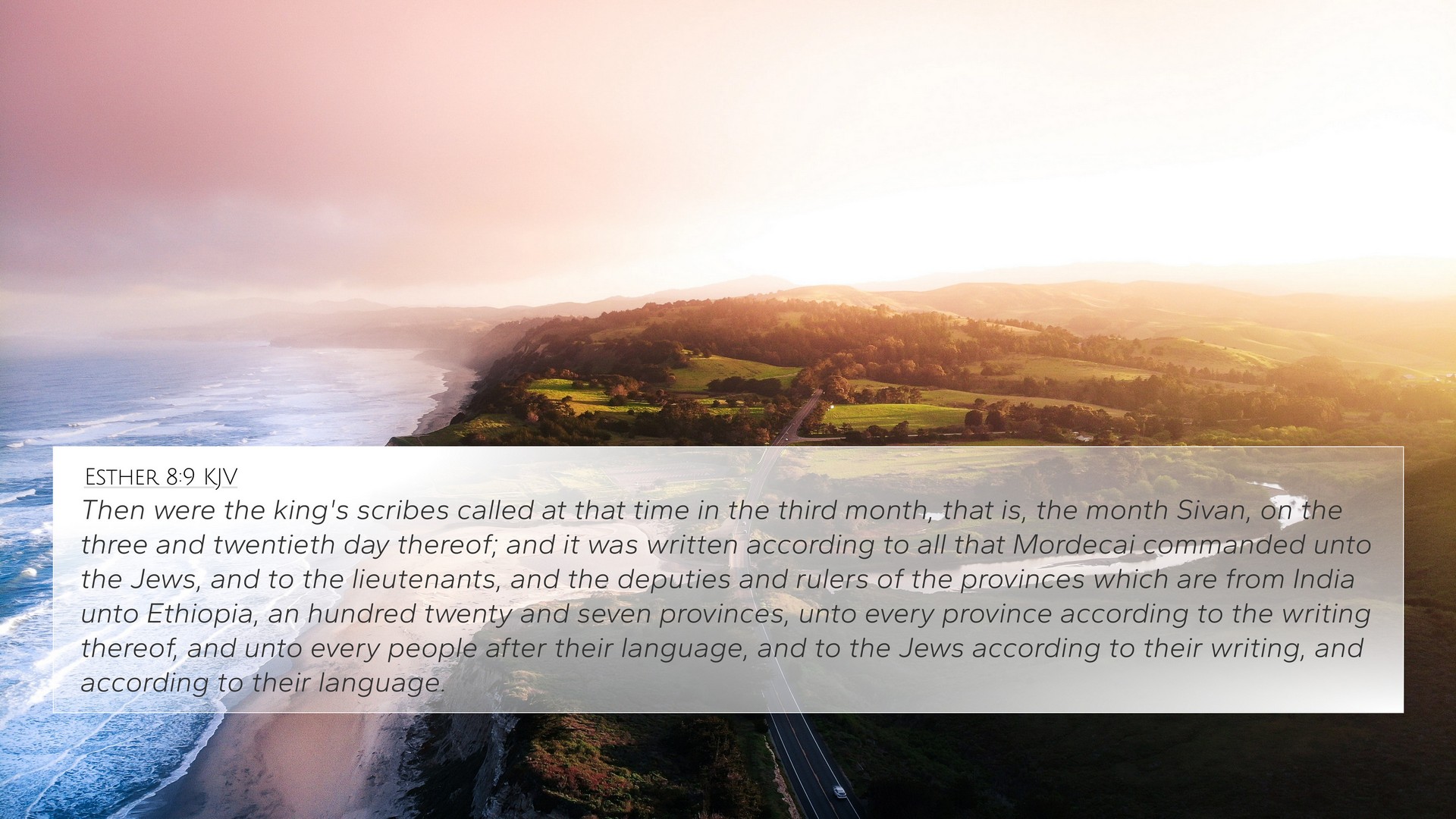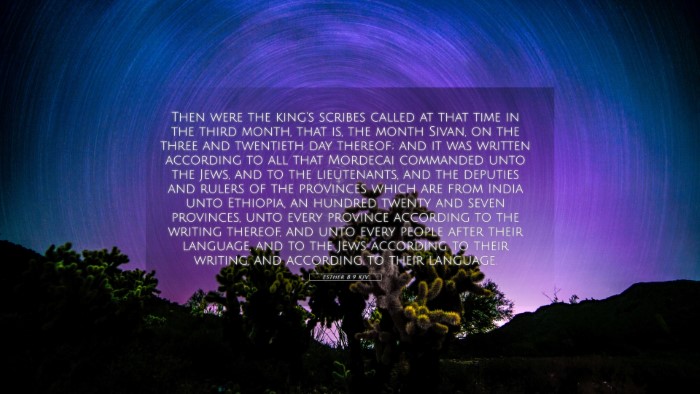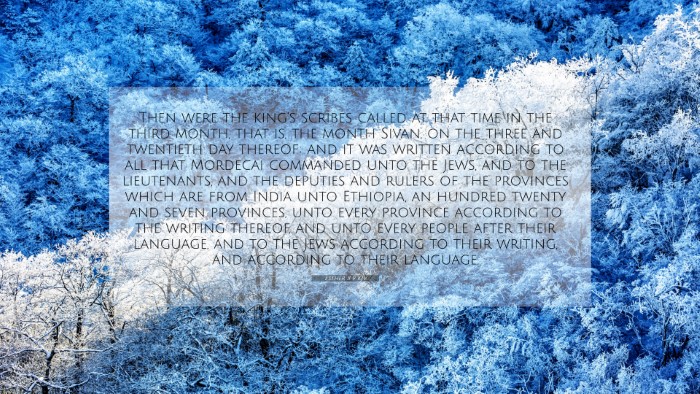Old Testament
Genesis Exodus Leviticus Numbers Deuteronomy Joshua Judges Ruth 1 Samuel 2 Samuel 1 Kings 2 Kings 1 Chronicles 2 Chronicles Ezra Nehemiah Esther Job Psalms Proverbs Ecclesiastes Song of Solomon Isaiah Jeremiah Lamentations Ezekiel Daniel Hosea Joel Amos Obadiah Jonah Micah Nahum Habakkuk Zephaniah Haggai Zechariah MalachiEsther 8:9 Similar Verses
Esther 8:9 Cross References
Then were the king's scribes called at that time in the third month, that is, the month Sivan, on the three and twentieth day thereof; and it was written according to all that Mordecai commanded unto the Jews, and to the lieutenants, and the deputies and rulers of the provinces which are from India unto Ethiopia, an hundred twenty and seven provinces, unto every province according to the writing thereof, and unto every people after their language, and to the Jews according to their writing, and according to their language.
Uncover the Rich Themes and Topics of This Bible Verse
Listed below are the Bible themes associated with Esther 8:9. We invite you to explore each theme to gain deeper insights into the Scriptures.
Esther 8:9 Cross Reference Verses
This section features a detailed cross-reference designed to enrich your understanding of the Scriptures. Below, you will find carefully selected verses that echo the themes and teachings related to Esther 8:9 KJV. Click on any image to explore detailed analyses of related Bible verses and uncover deeper theological insights.
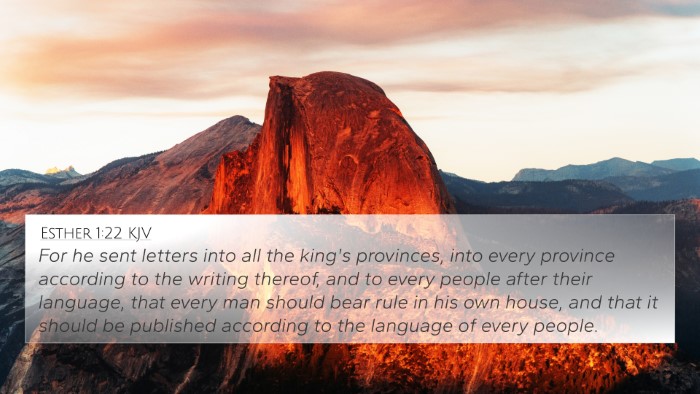
Esther 1:22 (KJV) »
For he sent letters into all the king's provinces, into every province according to the writing thereof, and to every people after their language, that every man should bear rule in his own house, and that it should be published according to the language of every people.
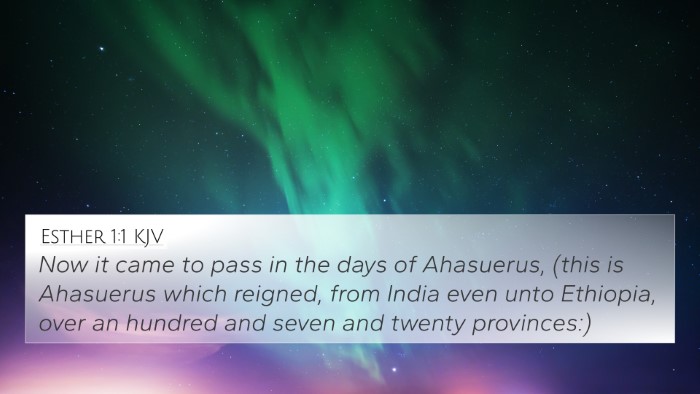
Esther 1:1 (KJV) »
Now it came to pass in the days of Ahasuerus, (this is Ahasuerus which reigned, from India even unto Ethiopia, over an hundred and seven and twenty provinces:)
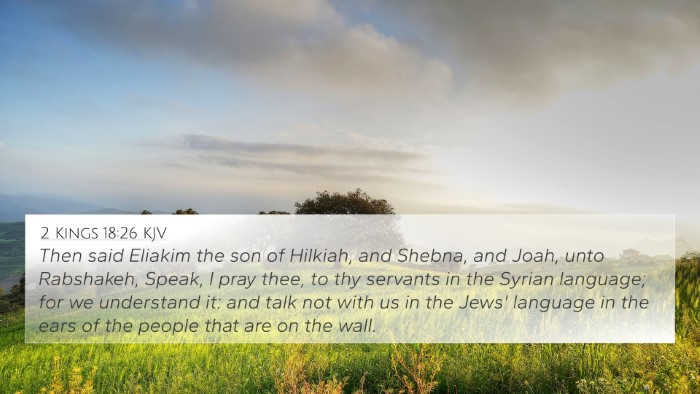
2 Kings 18:26 (KJV) »
Then said Eliakim the son of Hilkiah, and Shebna, and Joah, unto Rabshakeh, Speak, I pray thee, to thy servants in the Syrian language; for we understand it: and talk not with us in the Jews' language in the ears of the people that are on the wall.
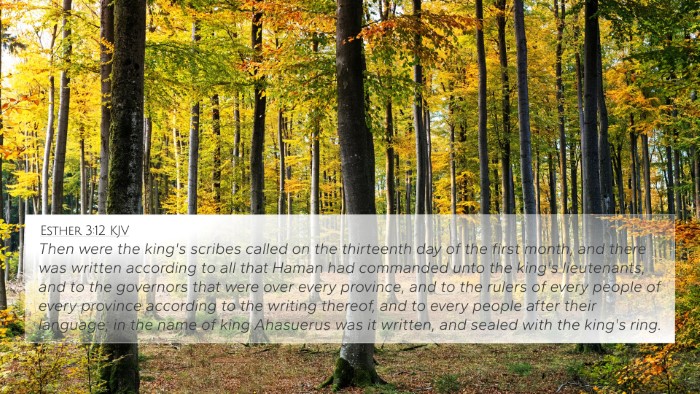
Esther 3:12 (KJV) »
Then were the king's scribes called on the thirteenth day of the first month, and there was written according to all that Haman had commanded unto the king's lieutenants, and to the governors that were over every province, and to the rulers of every people of every province according to the writing thereof, and to every people after their language; in the name of king Ahasuerus was it written, and sealed with the king's ring.

Daniel 6:1 (KJV) »
It pleased Darius to set over the kingdom an hundred and twenty princes, which should be over the whole kingdom;
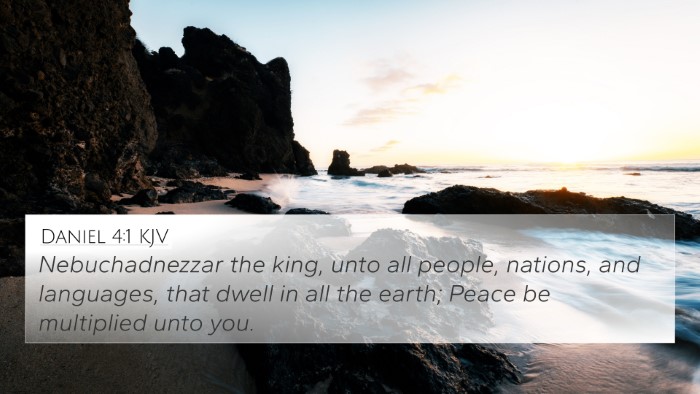
Daniel 4:1 (KJV) »
Nebuchadnezzar the king, unto all people, nations, and languages, that dwell in all the earth; Peace be multiplied unto you.

1 Corinthians 14:9 (KJV) »
So likewise ye, except ye utter by the tongue words easy to be understood, how shall it be known what is spoken? for ye shall speak into the air.
Esther 8:9 Verse Analysis and Similar Verses
Understanding Esther 8:9
Esther 8:9 states: "Then were the king's scribes called at that time in the third month, that is, the month Sivan, on the three-and-twentieth day thereof; and it was written according to all that Mordecai commanded unto the Jews, and to the governors and lieutenants and rulers of the provinces which are from India unto Ethiopia, a hundred twenty and seven provinces, unto every province according to the writing thereof, and unto every people after their language, and to the Jews according to their writing, and according to their language."
Summary of Meaning
This verse depicts a significant moment of decree and communication in the context of Esther's narrative. It emphasizes the meticulous execution of Mordecai's commands to address and empower the Jewish people across the vast Persian Empire.
Key Insights from Commentaries
- Historical Context: Matthew Henry points out the importance of the timeline mentioned – the third month, indicating a strategic moment for the Jewish people's deliverance. This aligns with the Jewish tradition of celebrating deliverance during the month of Sivan.
- Mordecai's Authority: Albert Barnes highlights Mordecai's role, illustrating his authority being respected, which contrasts his previous position of being in exile and threatened.
- Inclusivity of Communication: Adam Clarke elaborates on the necessity for the decree to be communicated in various languages, ensuring comprehension and unity among diverse groups, reflecting God's provision in a multicultural context.
- Divine Timing: Each commentary underscores the providential timing of God in restoring the fortunes of His people, emphasizing how God's timing aligns with human actions to ensure justice and victory.
- The Role of Officials: The verse also notes the involvement of scribes and the governance structure, indicating that God's deliverance is enacted through earthly authorities as well.
Bible Cross-References
- Esther 3:12 - The decree against the Jews.
- Esther 4:16 - Esther's call to action for her people.
- Esther 8:1-2 - The reversal of fortunes for Esther and Mordecai.
- Ezra 1:1-4 - God's sovereignty in raising up leaders for Israel's restoration.
- Daniel 9:2 - The prophetic timing related to the Jewish exiles.
- Isaiah 55:11 - The effectiveness of God's word and decrees.
- Mark 13:10 - The spread of the Gospel to all nations.
This verse serves as a backdrop for understanding the broader themes of restoration and God's providence in history. The connections between Esther and these references provide a rich tapestry of divine guidance and the significance of faithful leaders.
Thematic Connections
Esther 8:9 opens up a dialogue across various Scriptures highlighting:
- The power of communication: The written decrees underscore the Bible's emphasis on the written word as a means of both instruction and proclamation.
- The role of leaders: Figures like Mordecai illustrate the importance of courageous leaders in pivotal moments for God's people.
- Divine intervention: The narrative emphasizes how God works through human history to fulfill His promises.
Using Cross-References for Deeper Study
Engaging with cross-referencing Biblical texts can enhance one's understanding of Esther's context. Here are some tools and methods:
- Bible concordance: A great resource to find related verses.
- Bible cross-reference guide: Helps link scriptures based on themes and subjects.
- Cross-reference Bible study: Involves delving deeper into topics through a comparative lens.
Esther 8:9 is a powerful reminder of God's faithfulness to His people, revealing how the threads of history, language, and divine purpose intermingle. By cross-referencing and studying the connections between Bible verses, believers can gain profound insights into God's overarching narrative.
